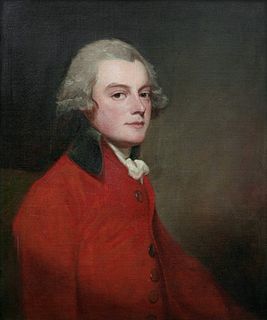William Harvey (1754–1779) was a British politician who sat in the House of Commons from 1775 to 1779.
The House of Commons is the elected lower house of the bicameral parliaments of the United Kingdom and Canada and historically was the name of the lower houses of the Kingdom of England, Kingdom of Great Britain, Kingdom of Ireland, Northern Ireland, and Southern Ireland. Roughly equivalent bodies in other countries which were once part of the British Empire include the United States House of Representatives, the Australian House of Representatives, the New Zealand House of Representatives, and India's Lok Sabha.
Harvey was the eldest son of William Harvey of Rolls Park, Essex, and his wife Emma Skynner, daughter of Stephen Skynner of Walthamstow, Essex, and was born on 10 September 1754. [1] He was admitted at Trinity College, Cambridge on 3 November 1771. [2]

Trinity College is a constituent college of the University of Cambridge in England. With around 600 undergraduates, 300 graduates, and over 180 fellows, it is the largest college in either of the Oxbridge universities by number of undergraduates. In terms of total student numbers, it is second only to Homerton College, Cambridge.
Harvey was abroad when he was approved unanimously at a county meeting and was then returned unopposed as Member of Parliament for Essex at a by-election on 28 November 1775. In Parliament, he only voted once and is not known to have spoken. [1]
Essex was a constituency represented in the House of Commons of the Parliament of the United Kingdom from 1290 until 1832. It elected two MPs, traditionally referred to as Knights of the Shire, to the House of Commons. It was divided into two single member constituencies in the Great Reform Act.
Harvey died unmarried on 24 April 1779 and was buried at Hempstead, Essex. [2] His estates passed to his brother Eliab Harvey. [3]

Admiral Sir Eliab Harvey was an eccentric and hot-tempered officer of the Royal Navy during the French Revolutionary and the Napoleonic Wars who was as distinguished for his gambling and dueling as for his military record. Although Harvey was a significant naval figure for over twenty years, his martial reputation was largely based on his experiences at the Battle of Trafalgar, when he took his ship HMS Temeraire into the thick of the action. Harvey used Temeraire to force the surrender of two French ships of the line and later created his family motto from the names of his opponents in the engagement; "Redoutable et Fougueux".










